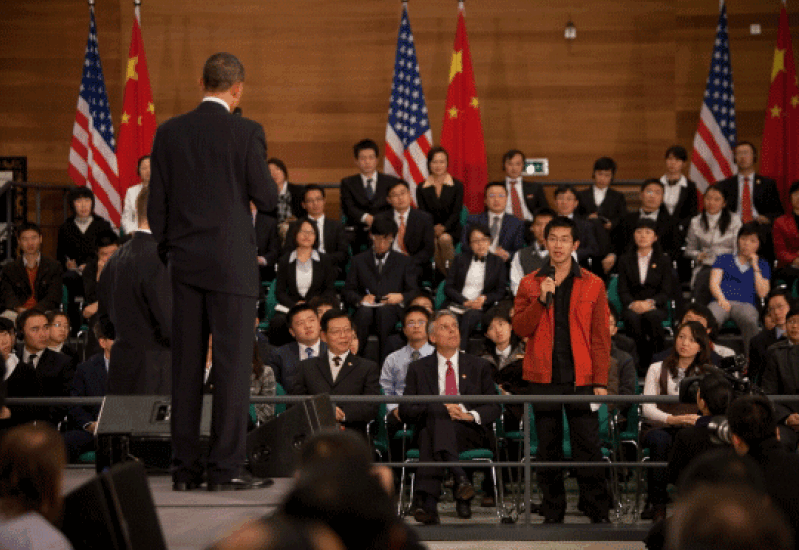
America will always speak out for the core principles that have served as the nation’s “compass,” President Obama said during his first full day of his visit to China.
During a town hall-style meeting with future Chinese leaders in Shanghai, the president assured the crowd of young people that the United States does not seek to impose any system of government on any other nation.
“[B]ut we also don't believe that the principles that we stand for are unique to our nation,” he continued. “These freedoms of expression and worship, of access to information and political participation, we believe are universal rights. They should be available to all people, including ethnic and religious minorities – whether they are in the United States, China, or any nation.”
Though the Chinese government has been recognized for accommodating some religious practice, persecution watchers say repression and religious freedom abuses still persist against unregistered Christians, Tibetan Buddhists, Uighur Muslims, Falun Gong practitioners and religious groups the government considers “evil cults.”
According to the ChinaAid, a Texas-based organization that works to advance religious freedom in China, religious persecution of house church Christians has increased over the last two months as the Chinese government has allegedly stepped up its central government-led campaign repressing all religious activities, targeting registered and unregistered churches alike.
Recent incidents include the reported violence against the 50,000 members Linfen Fushan Church in Shanxi in September, the repression of Shouwang and Wanbang Churches earlier this month, and the locking down of Wanbang Missionary Church in Shanghai just this past Thursday.
Though Obama did not make any direct criticisms against China on the first full day of his three-day visit to China and gave only praise to the communist country, the president made clear where the United States stands on issues that have been points of contention between the two world powers.
"I'm a big supporter of non-censorship," Obama said when answering a question about China's firewall, which blocks access to many Internet sites to control the flow of information.
"I recognize that different countries have different traditions,” the president added in what some have noted as his strongest comments in China thus far. “I can tell you that in the United States, the fact that we have free Internet - or unrestricted Internet access is a source of strength, and I think should be encouraged."
While some have criticized Obama’s comments for being too broad, others have said the president’s measured tone on sensitive topics was a positive development that showed a rethinking of U.S. foreign policy since the previous administration.
"They are now more willing to take the role of a listener,” Xue Chen, a research fellow of Strategic Studies at the Shanghai Institutes for International Studies, commented to The Associated Press.
“And only in this way can the U.S. interests be better met," he added.
With Obama set to wrap up his first trip to China as president on Wednesday, attention will continue to be directed toward what the president says or doesn’t say in his remaining time. So far, Obama has been trying to find political balance, seeking help on urgent global problems while mulling if and when to raise concerns over human rights.
Obama's aides said in advance that the president would raise several human rights issues privately with Chinese leaders, including President Hu Jintao. But it was unlikely he would repeat those messages too stridently in public, in an effort to avoid angering his hosts.
The White House hoped Monday's town hall meeting with Chinese university students would allow Obama to relay U.S. values to the widest Chinese audience possible.
Notably, however, the president's comments on internet censorship and free speech were later scrubbed from some Chinese Web sites and played down or unmentioned in the Chinese media. Though a full Chinese-language transcript of the event was later posted on the official Xinhua News Agency website, four clicks were required to locate the relevant section.
Even steaming of the event on the White House's website was choppy and delayed for web users inside China.
China, the world's third-largest economy and the largest foreign holder of U.S. debt, has the world's most extensive system of web monitoring and censorship and has issued numerous regulations in response to the rise of blogging and other trends. Twitter, one of the 50 most popular websites worldwide, is blocked in China.







